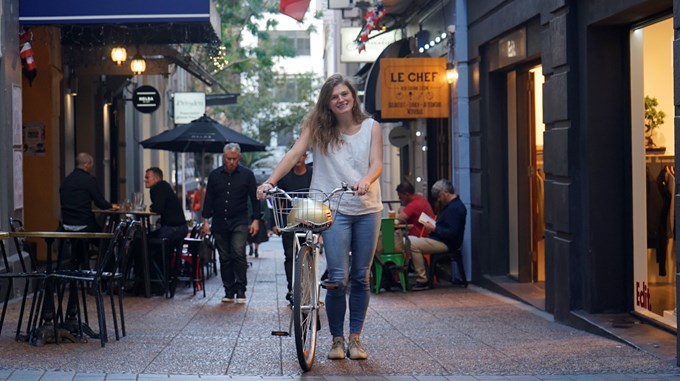Ellie Craft is a transport engineer, and urban designer who is an active member of Women in Urbanism Aotearoa and the newly formed Healthy Streets Alliance Auckland.
She tells us about the alliance, which is advocating to make streets safer and healthier for everyone.
What is the Healthy Streets Alliance Auckland?
The Healthy Streets Alliance Auckland, made up of many advocacy and not-for-profit charity groups, advocates for healthier cities and streets through city design.
Our name is inspired by Transport for London’s (TfL) Healthy Streets™ for London approach, developed by Lucy Saunders’ research into the health impacts of transport, public realm and urban planning. Healthy Streets for London aims to put health at the centre of city design, and so do we.
Why did the Healthy Streets Alliance Auckland form?
Auckland Transport’s proposed bylaw to set safer speeds set our alliance in action. We wanted to show that support is widespread for limiting traffic speeds and volumes. We support slow speeds because slower speeds are safer speeds, and slow streets are more equitable, inclusive, sustainable, and healthy.
Creating healthy streets and healthy cities is not only about reducing deaths and serious injuries on our roads. It should also be about improving physical inactivity, air pollution, noise pollution, carbon pollution, mental health, and community severance in our urban areas.
I am now going to unpack our reasoning for supporting slow speeds and healthy travel options in Tāmaki Makaurau:
1. Slow speeds are safer speeds
Speed has a direct influence on the occurrence of traffic crashes and their severity. Lower speeds and self-enforcing slow speed environments have been proved to save lives around the world.
2. Slow streets are equitable streets
Slow streets give people greater choice about how they get around. The most common barrier to cycling is a fear of high traffic density and speeds. Children's independent travel has reduced massively in the past 30 years, due to parental concerns over traffic safety.
Slow speeds benefit members of our communities who cannot, or prefer not to drive due to age, disabilities, low incomes or health and environmental concerns. We need to design for walking and cycling so that our streets are inclusive.
3. Connected communities
Community severance occurs when transport infrastructure or motorised traffic divides space and people. This results in social exclusion and segregation. The chance of neighbourhood interaction and improved connectivity occurs with reduced traffic volume and speed.
4. Slow speeds make less polluted streets
39 per cent of Auckland's emissions is from transport. Not only do slower speeds encourage people to replace trips by car with trips by active modes, but they also lead to steadier speeds in urban environments due to the reduced occurrence of acceleration and deceleration. This reduces carbon, air and noise pollution.
5. Posted speeds are not often the key factor to prevailing journey times
Intersections and traffic volume often have more impact on the journey time than the posted speed. Reduced posted speeds reduce acceleration between traffic signals and make crossing safer.
6. Slow speeds mean physically active streets
When we don't feel safe walking or cycling on our streets, we instead rely on our cars. Providing the choice of walking or cycling creates more physically active and healthier cities.
7. Slow speeds are economic streets
This one is for people who think money is more important than humans – the ones who cry out “where’s the business case?” or “but where will the cars park?”
People who walk and cycle spend more money than those who drive.
The Alliance for Healthy Streets thinks it’s pretty evident that we need to slow our streets down and refocus our street design on people. It’s clear Auckland Transport is working on this.
Setting these speed limits is great, and you have the support of the Healthy Streets Alliance Auckland. But let’s go even further and make Auckland the healthiest, happiest and most inclusive city in the world.


